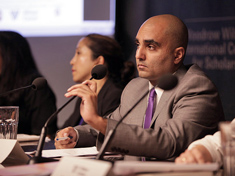-
Overcoming Malnutrition Key to Maternal and Child Health Improvements, Says Dr. Ranu Dhillon
August 29, 2014 By Sarah Meyerhoff
With less than 500 days until they expire, it’s almost certain that the Millennium Development Goals on child mortality and maternal health will be missed by many countries. Already, work on drafting the MDG successors has begun; but unless policymakers put nutrition at the center of maternal and child health systems, reducing global maternal and child mortality ratios by an appreciable amount will be difficult, says Dr. Ranu Dhillon in this week’s podcast.
With less than 500 days until they expire, it’s almost certain that the Millennium Development Goals on child mortality and maternal health will be missed by many countries. Already, work on drafting the MDG successors has begun; but unless policymakers put nutrition at the center of maternal and child health systems, reducing global maternal and child mortality ratios by an appreciable amount will be difficult, says Dr. Ranu Dhillon in this week’s podcast.
“The issues of nutrition and health…sometimes get separated out when we talk at a policy level,” says Dhillon, a global health expert from Columbia University and Harvard Medical School who has worked on strengthening health care systems in India and other developing countries for more than a decade.
“Half of child deaths are driven by undernourishment”Health system designs are “often premised on ‘how do we close the gap on MDG 4 and 5,” he says, which cover reducing the under-five mortality rate by two-thirds, reducing the maternal mortality by three-quarters, and achieving universal access to reproductive health.
But “half of child deaths are driven by undernourishment,” he says, and malnutrition can have lasting implications for children that survive. In total, one-fourth of all children under 5 – 165 million children globally – are permanently stunted from malnutrition, says Dhillon. They face physical and cognitive deficiencies and vulnerability to disease and illness through adulthood. Limited cognitive development, for example, can lead to poorer education outcomes, which in turn can lead to a reduction in income potential – 22 percent on average, according to UNICEF.
However, addressing malnutrition in children, as Dhillon says, requires paying more attention to mothers. As he illustrates through the story of Reena, a severely malnourished infant he encountered while on a site visit to a clinic in India, pregnant women who suffer from nutrient deficiencies are likely to pass them on to their children. This intergeneration cycle of malnutrition is fueled by economic and gender inequality and compounded by broken health systems. Poorer women like Reena’s mother lack the means and rights to attain food and care for themselves and their children, and the health facilities that they can access, are usually short on supplies, skills, and staff.
Breaking the cycle starts with more effectively tackling nutrition issues, says Dhillon. Health systems should be reconfigured to offer “true primary health care” that addresses a broader spectrum of maternal and child health issues, particularly malnutrition, and does so proactively, rather than tackling problems after they’ve spiraled out of control.
“Things Are Not Stuck the Way They Are”
To build such a system, he explains, requires empowering mothers and health care providers.
“There’s enough people – poor and privileged – who see the ways things are as intolerable and unacceptable”Care providers, from doctors to clinic staff to community mobilizers, should be equipped with the training to adequately treat patients, as well as maintain what Dhillon calls “organizational complexity” – managing multiple, interrelated interventions across health systems.
As patients, mothers must be able to demand services and accountability from providers. He explains, for example, that Indian women in areas of high literacy, like Kerala state, “will not only meet the system halfway, they’ll show up at its door,” demanding proper services, whereas mothers like Reena’s have a general sense of their children’s health needs but are “not empowered to actually force the system to perform.”
“Things are not stuck the way they are,” says Dhillon. “There’s enough people – poor and privileged – who see the ways things are as intolerable and unacceptable… When we start making the system reforms, I think you can have a virtuous cycle where the system reforms are actually reinforced by people actually being empowered and getting what they need and demanding [those services] to be there the next time.”
Dhillon spoke at the Wilson Center on July 27.
Friday podcasts are also available for download on iTunes.
 A Publication of the Stimson Center.
A Publication of the Stimson Center.




